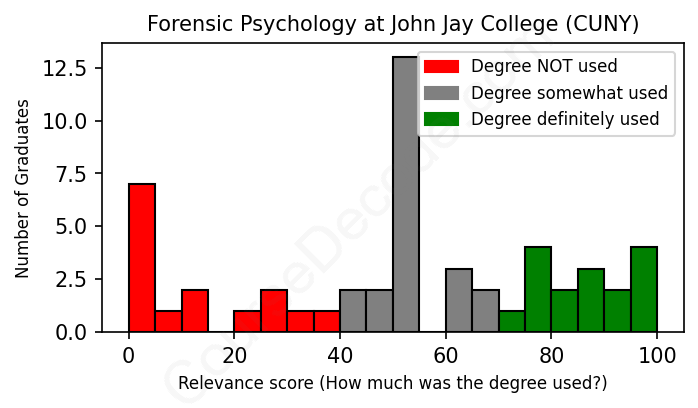
First, some facts. Of the Forensic Psychology graduates from John Jay College (CUNY) we've analyzed , here's how many have used (or NOT used) their degree in their career:

These are estimates based on AI analysis of 53 LinkedIn profiles (see below).
The verdict? Significantly below average. Overall, with an average relevance score of 51%, Forensic Psychology graduates from John Jay College (CUNY) have a much lower likelihood (-16%) of finding work in this field compared to the average graduate across all fields:
And for comparison, here's the chart for all profiles we've looked at across all degrees.
Also, after graduating, only 28% of these graduates have pursued further education other than another Bachelor's degree (such as a Masters degree or other), compared to the average across all profiles of 35%. This suggests a Bachelors degree is enough for most Forensic Psychology graduates, and it's normal to look for work straight after graduation.
See the details:
|
Relevance score: 100% We think this person has gone into a career highly relevant to their degree. We think this person has gone into a career highly relevant to their degree.
DEGREE INFOGraduated in 2020 from John Jay College (CUNY) with a Bachelor of Arts - BA in Forensic Psychology. Also pursued further education since (see below). JOB HISTORY SINCE GRADUATIONJudicial Intern for Hon. Francois A. Rivera New York State Supreme Court Feb 2020 - Aug 2020 Judicial Intern for Hon. Connie Mallafre Melendez  New York State Supreme Court Jun 2020 - Aug 2020 Legal Intern  Bronx County District Attorney Office Jun 2021 - Aug 2021 Legal Intern  NYC Mayor's Office to End Domestic and Gender-Based Violence Jun 2022 - Aug 2022 Research Assistant for Prof. Eduardo R. Capulong  City University of New York School of Law Oct 2022 - Apr 2023 Assistant District Attorney (Pending Bar Admission), Special Victims Bureau  Brooklyn District Attorney's Office Aug 2023 - Present FURTHER DEGREES DONE SINCE GRADUATINGDoctor of Law - JDCity University of New York School of Law 2020 - 2023 ABOUTNo information provided. |
The top 10 most common jobs done by the graduates we've analyzed (ranked most common to least) are:
When looking at the career paths of individuals who graduated with a degree in Forensic Psychology from John Jay College, it's interesting to see a wide variety of jobs that span many different fields. You might expect most graduates to end up in direct roles related to criminal justice or mental health, but the reality is a bit more mixed. Many graduates ventured into positions that are only tangentially related, or even completely separate from what you’d associate with forensic psychology. For example, lots of people found roles like administrative assistants, case managers, or even customer service representatives, which generally don’t utilize the specific skills tied to forensic psychology.
Looking at the data, a significant number of graduates landed jobs in social services, counseling, or as therapists, which definitely relates back to forensic psychology. Positions like psychotherapist, case manager, and behavioral therapists are strongly connected since they often involve understanding client behavior, processing psychological assessments, and applying therapeutic techniques. Notably, positions such as Criminal Justice Intake Specialist or Psychotherapist show a strong connection to the knowledge gained from the degree and an understanding of criminal behavior, mental health, and client interaction. However, many graduates seem to settle into jobs that rely more on general people skills and administrative functions. For example, roles in real estate, retail, or as administrative assistants don't call for specialized forensic psychology knowledge. So, while some graduates found their way into meaningful roles that leverage their education, many others took on jobs that are less directly related to their studies.
Ultimately, the landscape for forensic psychology graduates from John Jay College is wide-ranging and somewhat diverse. While some definitely capitalize on their education in meaningful ways, a lot of graduates seem to blend into more general fields or switch to roles outside of mental health and criminal justice. It’s a mixed bag that shows how versatile a degree in forensic psychology can be, while also highlighting the challenges some may face in securing highly relevant roles in their chosen field.
Here is a visual representation of the most common words in job titles for Forensic Psychology graduates (this is across all Forensic Psychology graduates we've analyzed, not just those who went to John Jay College (CUNY)):

Looking at the career trajectories of graduates from John Jay College (CUNY) who specialized in Forensic Psychology, it’s clear that there’s quite a variety in the paths they’ve taken post-graduation. A lot of these folks have ended up in roles that sort of tie back into the world of social services, mental health, or criminal justice, which is great for a degree focused on understanding criminal behavior and aiding those affected by it. However, the successes are mixed with quite a few graduates who seem to have taken broader paths that may not directly relate to their forensic psychology background.
When we zoom in on what graduates did right after college, many started with positions like case managers, research assistants, or administrative roles, which can sometimes feel like a stepping stone rather than a direct application of their degree. For instance, those who graduated around 2010 often began their careers as substance abuse counselors or in housing support roles. By the five to ten-year mark, several of these graduates managed to climb the ladder a bit, landing more senior roles in social services or mental health environments. Some have even established their own practices, demonstrating the knack for entrepreneurship in mental health.
Now, for those looking five to ten years down the line, quite a few graduates are still orbiting around the same fields but have secured roles that reflect a bit more responsibility or specialization. We've got people becoming licensed psychotherapists, program directors, or even administrative leaders in healthcare settings. It's impressive to see many working as social workers or in legal roles that still connect back to their forensic psychology background, like criminal defense attorneys or legal aides, which shows they might've capitalized on their foundational skills. However, on the flip side, there are also many who seem to have veered off into unrelated fields entirely, such as retail, non-profit admin, or even positions in HR, which could leave one wondering if they felt their degree wasn't applicable enough for them to utilize.
Overall, while many John Jay graduates have indeed carved out successful careers relevant to Forensic Psychology, there’s definitely a portion who’ve found themselves in jobs that stray from their area of study. It’s kind of a mixed bag – some are thriving and making a difference in mental health or justice systems, while others are taking on roles that might not leverage their education as much as they hoped. So, when considering this college, it’s important to think about how you want to align your future with your major, as it seems like there are plenty of opportunities but also plenty of choices that don’t directly connect back to Forensic Psychology.
Getting a Bachelor’s degree in Forensic Psychology, whether at John Jay College or elsewhere, can be a bit of a mixed bag in terms of difficulty. It’s definitely not a walk in the park; you’ll be diving into a mix of psychology, criminal justice, and a bit of law, which means you’ll need to hit the books hard and really engage with some complex concepts. That said, if you enjoy those subjects and are willing to put in the effort, it can be super interesting and rewarding. Some students find it more challenging than a typical liberal arts degree mainly because of the specialized knowledge required, while others who love the field might find it more manageable. Overall, it requires commitment and passion, but it’s definitely doable if you’re willing to put in the work!
Most commonly, in the LinkedIn profiles we've looked at, it takes people 4 years to finish a Bachelor degree in Forensic Psychology.
Looking at the career paths of these John Jay College Forensic Psychology graduates, it seems like there's quite a mix when it comes to earning potential. Some have landed in positions that typically offer stable salaries, like those working in legal roles, healthcare, or social work. For instance, the graduates who moved into roles such as District Manager, Senior Sales Consultant, and even law-related positions like Assistant District Attorney likely earn a pretty decent income, potentially ranging from the mid to upper end of salary scales for these fields. However, many of the earlier positions, especially in counseling and case management, tend to be on the lower side of the pay scale, often giving starting salaries that can be less than appealing, especially in high-cost living areas like New York City.
Looking for a more well-rounded picture, it’s important to note that some graduates have shown resilience and adaptability in their job choices, sometimes jumping from lower-paying roles into more lucrative careers over time. Others have pursued higher education or specialized training, setting them up for better-paying positions in mental health, social work, or even corporate roles. Overall, while some of these grads are likely making a decent living, especially in senior roles, others might still be navigating their way up in fields that start off less lucrative. The trajectory tends to improve with experience and continued education, so it's crucial to keep that in mind when analyzing their earnings potential!
Here is a visual representation of the most common words seen in the "about" section of LinkedIn profiles who have a Bachelor degree in Forensic Psychology (this is across all Forensic Psychology graduates we've analyzed, not just those who went to John Jay College (CUNY)). This may or may not be useful:

Here are all colleges offering a Bachelor degree in Forensic Psychology (ordered by the average relevance score of their Forensic Psychology graduates, best to worst) where we have analyzed at least 10 of their graduates:
| College | Score | Count |
|---|---|---|
 Southern New Hampshire University Southern New Hampshire University
|
61 | 14 |
 John Jay College (CUNY) John Jay College (CUNY)
|
51 | 53 |
 City University of New York-John Jay College of Criminal Justice City University of New York-John Jay College of Criminal Justice
|
43 | 13 |